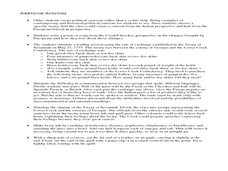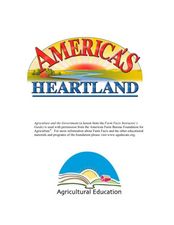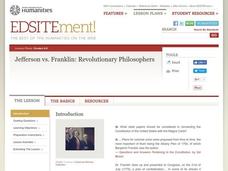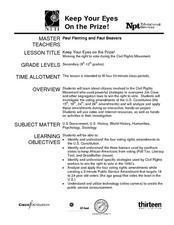Curated OER
Interpreting Foundation Documents of the American Republic
Explore early American documents that qualify as primary sources. Tenth and eleventh graders use the provided worksheets to analyze the texts of the Articles of Association, the Declaration of Independence, the Articles of Confederation,...
Curated OER
Colonial America: Causes of the American Revolution
Fourth graders analyze colonial rule and policies with regard to the causes of the American Revolution. In this Colonial America simulation lesson, 4th graders role play in an Independence Game, reacting to a variety of "events" that...
National Endowment for the Humanities
The Creation of the Bill of Rights: “Retouching the Canvas”
While the Constitutional Convention lay the foundation of the new government for the United States, the protections given under the Bill of Rights were controversial. Using documents, such as James Madison's and Thomas Jefferson's...
PBS
Evolution of the Presidency: Theodore Roosevelt to Franklin D. Roosevelt
How much power should a president be allowed to exert? Theodore Roosevelt and Franklin D. Roosevelt exercised their power according to their interpretations of the United States Constitution, and these interpretations affected the...
Center for Civic Education
Citizenship Schools and Civic Education During the Civil Rights Movement and in the Present
Your young historians will discover the importance that citizenship education has played in the social progress of the United States as they learn about early efforts to discourage African Americans from voting in the 1960s.
John F. Kennedy Presidential Library & Museum
Military Advisers in Vietnam: 1963
How did the beginning of the Vietnam War factor into the Cold War with the Soviet Union? As part of a study of American involvement in Vietnam, class members read a letter address to President Kennedy and his response in which he...
Curated OER
The Federalist Defense of Diversity: Extending the Sphere
How did early Americans ensure expansion while also securing the rights of citizens? Alexander Hamilton and James Madison, two of our early leaders, considered the problem of faction to be the "mortal disease" that created unstable...
Curated OER
Native Lands: Indians in Georgia-Shifting Ground Political Cartoon-Introduction
Students explore the relationship between the Creek, Cherokee, and European/American cultures prior to the American Revolution. Students do Internet research to identify and explain changes in these cultures, then create six panel...
Curated OER
Seals: From the National To the Local
Third graders investigate official government symbols by completing a scavenger hunt. In this U.S. Government lesson, 3rd graders participate in a scavenger hunt in which they locate seals or logos in their community. Students...
Curated OER
The United States Flag
Young scholars study the United States flag. In this American history and government lesson, students define and give examples of familiar symbols. Young scholars design a classroom flag. Students identify and describe the American flag.
Curated OER
Agriculture and the Government
Students study the government's involvement in the U.S. A's food production and make connections relating to farm programs. In this historical agriculture lesson, students read content and research significant information. Students then...
Constitutional Rights Foundation
History of Immigration From the 1850s to the Present
The Statue of Liberty may embrace the huddled masses of the world, but has American society always joined in? After young historians read a passage about the history of American immigration in the 19th and 20th centuries, focusing on...
Curated OER
The Impact of the IWW on the Nation or Who were the Wobblies?
Students evaluate the role labor groups had on the U.S. Government in the early 1900's. For this teaching American history lesson, students complete several activities, including response writing and listening to music, that reinforce...
Curated OER
A Famous Signature
Students study important historical figures. In this United States history lesson, students trace the signature of John Hancock using cotton swabs, glitter, and various art supplies after discussing the historical significance of the...
Curated OER
Alexander Hamilton and the Roots of Federalism
Explore the origin of political parties in the United States. Learners work in groups to read and analyze copies of the "Report on Manufactures" written by Alexander Hamilton. Then, they complete a worksheet comparing the Federalists to...
PBS
Lessons in Leadership, Roosevelt Style
It's easy to criticize those in power until you're sitting at their desk, faced with the same decisions. A history lesson prompts secondary learners to research the Roosevelt presidencies through the lens of leadership and...
Curated OER
Is FEMA a Natural Disaster?
High schoolers develop an understanding of FEMA and reflect about the consequences of a natural disaster. In this natural disaster instructional activity, students are asked specific questions after reading several stories. After class...
Curated OER
A Lesson To Accompany "The First Bank of the United States: A Chapter in the History of Central Banking"
Here is an interesting topic. Learners examine the economics that led to the founding of the First Bank of America. They participate in a reader's theater experience depicting the debate between Alexander Hamilton and Thomas Jefferson...
Curated OER
Jefferson vs. Franklin: Revolutionary Philosophers
Students cite connections among Franklin's Albany Plan of 1754, his Plan of Confederation of 1775 and the U.S. Constitution and/or the Declaration of Independence. In an essay, they give examples of the philosophical and political...
Curated OER
Keep Your Eye On the Prize
High schoolers learn about citizens who were actively involved in the civil rights movement, and the strategies they used to overcome the Jim Crow laws that were so prevalent in the 1960s. They investigate the voting amendments of the US...
Roy Rosenzweig Center for History and New Media
The Homestead Act
To understand how the Homestead Act of 1862 changed the US and the lives of the people during that time, class members examine primary source materials including letters, broadsides, and images. They then assume the voice of a...
Curated OER
Blasphemy! Salman Rushdie and Freedom of Expression
Students explore the concepts of blasphemy, censorship and freedom of expression through the lens of Salman Rushdie. They also consider how these issues have been reflected in US history.
Curated OER
Acting Legally
Students analyze potential challenges that immigrant women have in the workforce. In this history instructional activity, students identify specific problems immigrant women face, then brainstorm possible solutions in their group. The...
























